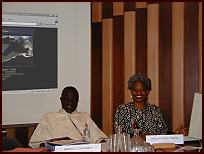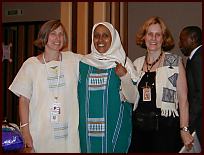ActInvest International Workshop, World Summit on Social Development +5, Geneva Forum 2000 ITU, June 29th
From Village Stall to Global Markets: Entrepreneurs and E-Commerce
The purpose of the Workshop was to address the objectives of the Geneva Forum 2000 and which were promoted by the Swiss Confederation, namely bringing together all stakeholders in social development, especially the private sector, in order to catalyze and share knowledge to eradicate poverty. Two fundamental questions were asked- "What can the internet do to enhance trade and commerce for all and not just for the lucky few?" And "What has changed since Copenhagen in 1995?" The divide between the rich and the poor has increased, not diminished, and 80 countries both developing and countries in transition, have GNPs lower than in 1995. The Workshop targeted the role of the entrepreneur in closing the gap: whether in micro, small and medium enterprises or international corporations. Attention focused on the massive changes brought about by the Internet and information technology (IT) especially the innovative use of the Internet for social development.

Amidou Coulibaly and Haoua Cheick Traore present African Crafts Online
Dunia Pastizzi-Ferencie opened the discussions by emphasizing the importance of linking macro, mezzo and micro economies. Participants then heard how different enterprises benefited from IT. Louise Meyer discussed her website -African Crafts Online- which assists African artisans to document their culture and market their products by means of the Internet. In her presentation she showcased the work of Amidou Coulibaly, a weaver from Northern Ivory Coast, and the virtual shop of Haoua Cheick Traore. Felix Muhlebach, President of MatchingNeeds.com, a company that matches information needed by small and medium enterprises globally, shared the challenges they faced as an internet start-up company, especially that of investment. Dr. Thomas Morscher of Daynetwork.com, a Swiss company that provides software for "Web Information Management Solutions" for businesses, discussed their experiences from a small start-up to a global company. Christopher Gibson from the World Intellectual Property Organisation (WIPO) analyzed the legal and value based aspects of E-commerce. Finally, Bob Berg spoke of the effect of IT on development theory as well as intergenerational issues and how developing countries face critical challenges. Fatima Jibrell welcomed greater access and lower cost in order to better manage her Somali NGO and Esteban Gonzalez of Mexico said that young entrepreneurs should combine profit with non-profit development activities.

Hedy Glenn, UN, Fatima Jibrell, Horn Relief, and Louise Meyer
The proliferation of the Internet and IT is the most significant and promising change in the environment since WSSD in 1995. Information Technology has the capacity to enhance market share far beyond national borders while maintaining the importance of local and regional cultural diversity. E-Commerce can contribute to social development and strategies for IT should be included in national development plans. Local IT systems and appropriate education and investment are needed to increase access and equity. The corporate sector, especially, has much to offer in developing collaborative strategies to address these key issues. Finally, it was concluded that there is an urgent need to reshape the debate on globalization in order to focus an IT's importance to social development as well as economic development.
[note: we've since changed the name of our online presence from African Crafts Online to AfricanCraft.com]

